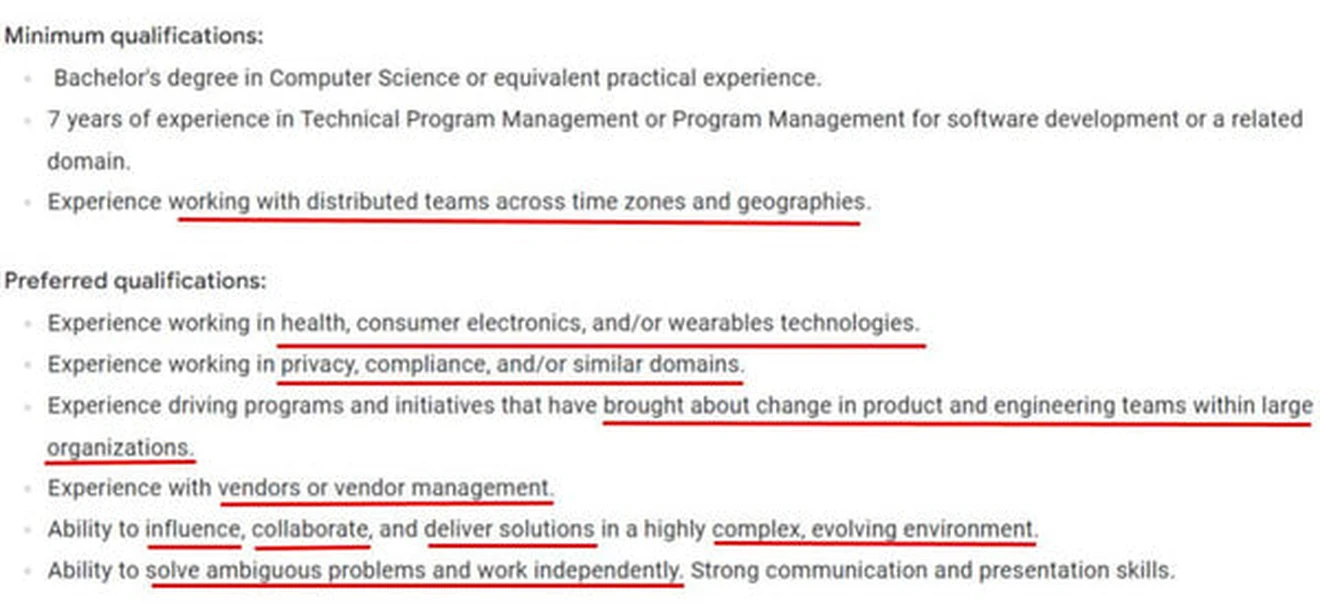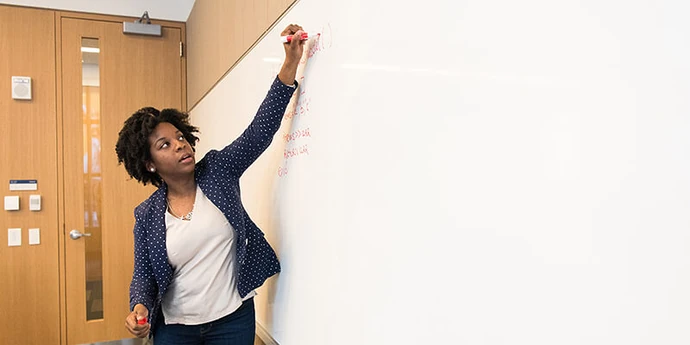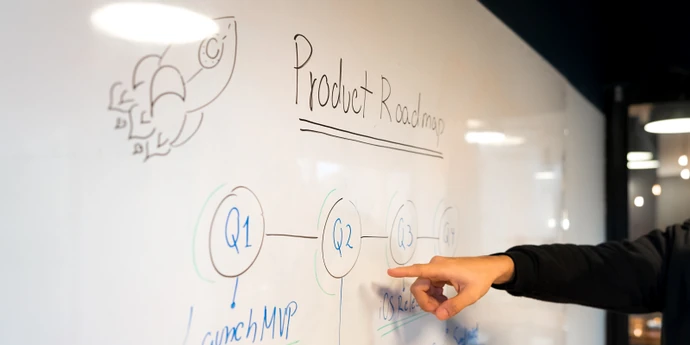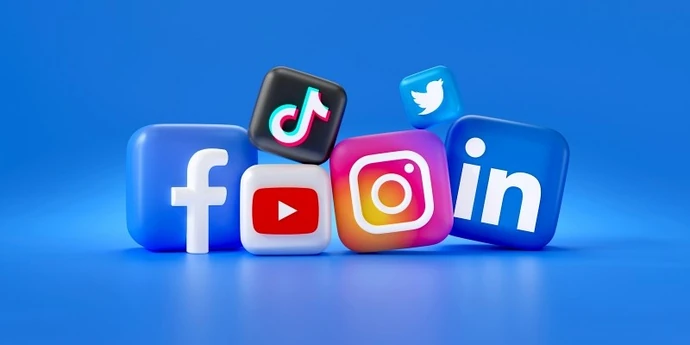Google RRK interviews (Role-Related Knowledge interviews) are difficult to prepare for. The questions vary widely by role, and it is tough to find information about them online.
That’s where we come in. We’ve studied hundreds of real Glassdoor interview questions across 10 roles at Google and used them to put together this guide to Google RRK interviews, including practice questions and a preparation plan.
The first thing that you should know about the Google RRK interview? The job description will be your top preparation tool.
Let’s get started.
- What is the Google RRK interview?
- Google RRK interview questions
- How to prepare for Google RRK interviews
Click here to practice mock interviews with ex-Google interviewers
1. What is the Google RRK interview?
Before diving into the RRK interview for the role you’re applying to, let’s take a look at what the RRK interview is and how it fits into the larger Google interview process.
1.1 What exactly is Google looking for?
Google evaluates its candidates on four main attributes: Role-Related Knowledge (RRK), General Cognitive Ability (GCA), Leadership, Googleyness.
Here’s an overview of each of these attributes
- Role-related knowledge and experience (RRK). The company wants to make sure that you have the right experience, domain expertise, and competencies for the position you're applying for.
- General cognitive ability (GCA). The company wants to hire smart employees who can learn and adapt to new situations. Here your interviewer will try to understand how you solve hard problems and how you learn. For more information, take a look here.
- Leadership. Google looks for a particular type of leadership called “emergent leadership.” You'll typically be working in cross-functional teams at Google, and different team members are expected to step up and lead at different times in the lifecycle of a project when their skills are needed.
- Googleyness (i.e. culture fit). The company wants to make sure Google is the right environment for you. Your interviewer will check whether you naturally exhibit the company's values, including: being comfortable with ambiguity, having a bias to action, and a collaborative nature.
These attributes are assessed across the interview process, most notably during the final onsite or virtual loop.
In some cases, candidates’ final interviews are explicitly labeled with these attributes (e.g. one GCA interview, two RRK interviews, and one Googliness & Leadership interview).
In other cases, candidates’ interviews are labeled by the skills necessary for the position (e.g. two Coding interviews, one System Design interview, and one Leadership interview), in which case the interviewers will include questions that test a combination of these attributes in each round.
Now let’s take a closer look at RRK interviews and interview questions.
1.2 The Google RRK interview
Google RRK interviews typically last 45-60 minutes and are run by a hiring manager, a senior employee, or the manager of the team you’re applying to join.
Here is how Google describes the RRK interview: “We’re interested in how your individual strengths combine with your experience to drive impact. We don’t just look for how you can contribute today, but how you can grow into different roles—including ones that haven’t even been invented yet.”
Here are some important points to take away from this definition:
- Highlight your individual strengths: Be ready to show off what unique capabilities you have that make you the perfect fit for the job and team that you’re applying for.
- Explain your past experience to drive impact: Use examples from your past experience that show what impact you’ve had in previous roles, and dive deep when solving problems given to you by the interviewer.
- Prove that you can grow into different roles: While you should tailor your answers as close to the role as possible, don’t forget to show some creativity and flexibility in your answers, which will allow you to adapt to evolving positions.
The exact questions that interviewers ask in RRK interviews vary widely, depending on the role and team that you’re applying to join.
That being said, there are 3 general types of questions that come up across roles:
- Behavioral questions (all roles), usually starting with “tell me about a time…”, which test your alignment with the role based on examples from your past experience
- Hypothetical questions (all roles), which explore how you would react to hypothetical scenarios that are likely to come up on the job
- Technical questions (technical roles), which focus on your ability to understand technical concepts and solve technical problems
Let’s look into some examples of these types of questions, based on interview reports by real Google candidates.
2. Google RRK interview questions
As we mentioned before, the exact RRK questions that you’ll face will depend on the position and team you’ve applied to join.
While we can’t give you the exact list of questions that you’ll be asked (though there will be tips for finding out in section 3), studying past questions that have been asked at Google for similar roles can give you an idea of what to expect and how to start preparing.
So we’ve collected interview questions for top Google technical roles, according to real interview reports from past candidates on Glassdoor. Note that we’ve edited some questions for clarity.
2.1 Google product manager RRK interview
Google product managers must be able to design new product features and improve existing ones, set product roadmaps, and work with a diverse group of stakeholders. Interviewers will be testing your competencies in these areas during the RRK interview.
In addition to these general PM skills, interviewers will test you on additional qualifications that are specific to the position you’ve applied for. This could include: experience with 3D Graphics and VR/AR (Hardware - Project Starline), experience in Android and/or mobile app development (Android Backup and Restore), industry experience in FinTech (Payments Platform Compliance - Anti-Financial Crime), or others, depending on the role you’re targeting.
Take a look at the questions below, from real Google PM candidates, to get an idea of the general product manager RRK interview questions that may come up in your interview.
Note that this list contains a combination of PM interview questions categories like design, strategy, estimation, etc. For more information about the categories and subcategories of PM interview questions asked at Google, take a look at our complete guide to the Google product manager interview.
Example Google RRK interview questions: product manager
Behavioral
- Tell me about a product or feature that you’ve led from start to finish.
Hypothetical
- How would you measure the success of Apple's WWDC event?
- How do you make product decisions? How do you run your product lifecycle?
- Google has invented a technology that makes air travel 4x cheaper and 4x faster. What do you do with it?
- How would you improve [Chrome / GMap / Android / etc]?
Technical
- How would you write an algorithm to do X?
- Describe a typical page load time distribution on desktop. What about on mobile?
2.2 Google software engineer RRK interview
Google software engineers solve some of the most difficult problems the company faces with code, and must be able to help design systems that are highly scalable and performant. Those in senior or leadership positions must also be able to lead projects end-to-end while managing a team.
Some of the role-specific skills that you may also be tested on could include: experience working on projects built on public cloud providers (Cloud Virtual Machines Lifecycle), experience building software for data privacy or security (Security/Privacy - Google Ads), experience developing accessible technologies (Engineering Productivity - Google Cloud Apps), etc.
Again, the list below includes a mix of competency-specific questions such as coding and system design. For a full breakdown of the types of coding, system design, and leadership questions that Google asks, take a look at our complete guides to the Google software engineer, data engineer, and machine learning engineer interviews.
Example Google RRK interview questions: software engineer
Behavioral
- Tell me about a recent / interesting project you worked on.
- Tell me about a time you were part of an organization in transition and how you helped them move forward.
Hypothetical
- How would you handle competing visions on how to deliver a project?
Technical
- Given a string S and a string T, find the minimum window in S which will contain all the characters in T in complexity O(n). (Solution)
- Given a list of query words, return the number of words that are stretchy. Note: see link for more details. (Solution)
- Given a rows x cols binary matrix filled with 0's and 1's, find the largest rectangle containing only 1's and return its area. (Solution)
- Design a task scheduling system.
2.3 Google engineering manager RRK interview
Google engineering managers must possess many of the same skills that Google’s software engineers have, with a higher emphasis on soft skills like people management, project management, and leadership. This is because they must move beyond individual tasks to leading teams and projects.
Beyond these skills, certain roles will require further expertise, such as experience working with advertising platforms (Google Ads), large scale system design experience (Automotive - Google Maps), knowledge of front-end frameworks (Google Design Platform), and other specifics.
For a more detailed breakdown of the leadership, coding, and system design questions that are asked in Google EM interviews, take a look at our full guide to the Google engineering manager interview.
Example Google RRK interview questions: engineering manager
Behavioral
- Tell me about a time you developed and retained team members.
- Describe a project in the past that was behind schedule and provide concrete steps that you took to remedy the situation.
Hypothetical
- Why are you an effective R&D leader?
- How would you balance engineering limitations with customer requirements?
Technical
- Design Google Docs.
- Given a binary tree, find the maximum path sum. The path may start and end at any node in the tree.
- Implement a SnapshotArray that supports pre-defined interfaces.
- Given a matrix and a target, return the number of non-empty submatrices that sum to target.
2.4 Google technical program manager RRK interview
Google TPMs must have a strong ability to plan, prioritize, and deliver projects, engage in system design and coding discussions with engineers, and work in cross-functional teams with other disciplines.
Depending on the role you’re applying for, you may also have to have experience with privacy principles and relative technologies (Privacy, Devices and Services), flow logistics and Pro-E, AutoCAD or equivalent systems (Data Center Server Operations), familiarity with agile, Scrum, or Kanban (Infrastructure, Waze), or other qualifications.
To dive deeper into the program management (e.g. prioritization, delivery, planning, etc), technical, and leadership interview questions that Google asks, read our complete guides to the Google technical program manager or program manager interviews.
Example Google RRK interview questions: technical program manager
Behavioral
- Tell me about a time you had to manage a technical program from end-to-end.
- Tell me about a time you had to manage a significant risk on one of your programs.
Hypothetical
- How would you manage a hypothetical project XYZ (e.g. replace discs in a data center)?
- How would you compare agile and waterfall methodologies?
- Imagine you find a critical bug in software the day before the release date. How do you handle the situation?
Technical
- How would you deploy a solution for cloud computing to build in redundancy for the compute cluster?
- Design a server infrastructure for GMail.
2.5 Google data scientist RRK interview
Google data scientists have to derive useful insights from large, and potentially complex datasets. This means that interviewers will likely test you on statistics and machine learning, SQL, and some coding, depending on the position.
Other role-specific competencies that interviewers may test you on in the Google RRK interview include experience in a consumer-internet, web analytics, or closely related role (gTech), experience in marketing analytics, e-commerce, or product analytics (Devices and Services), knowledge of Bayesian modeling framework (Global Media Lab), etc.
To get a more detailed idea of the types of statistics and machine learning, coding, SQL, and leadership questions that Google interviewers ask, take a look at our complete guide to the Google data scientist interview.
Example Google RRK interview questions: data scientist
Behavioral
- Tell me about a time you used data to make a critical decision.
Hypothetical
- How do you sort your priorities when engaged in multitasking?
- How would you remove bias and make inferences from data about two ad campaigns?
Technical
- Explain a probability distribution that is not normal and how to apply that.
- If two predictors are highly correlated, what is the effect on the coefficients in the logistic regression? What are the confidence intervals of the coefficients?
- For sample size n, the margin of error is 3. How many more samples do we need to make the margin of error 0.3?
- Write a function to generate N sample from a normal distribution and plot the histogram.
- What are some ways to effectively reduce the dimensionality of a data set?
3. How to prepare for Google RRK interviews
Now that you’ve got an idea of what types of questions are asked in Google RRK interviews, let’s go over how you can prepare for yours.
3.1 Study the job description
Because RRK interviews are highly variable according to what position you’re interviewing for, the job description is the best place to start when preparing for your interview.
For example, let’s take a look at the qualifications Google has listed for this Technical Program Manager position in Fitbit Ecosystem and Privacy:

Some of the minimum qualifications such as a Bachelor’s degree and general experience in program management were likely already screened on your resume and covered in the initial recruiter and/or screening calls.
The more specific qualifications are subjects that may come up in the RRK interviews for this role. We’ve underlined them in red.
For each section, consider examples from your past experience that highlight your competency in that area. Think of hypothetical work scenarios that involve that skill, and how you would address them.
For example, with “experience with vendors or vendor management,” think of challenges that you’ve faced with vendors in the past. How did you address those challenges? If in the future you’re faced with a vendor who is having a problem with a Fitbit privacy update, how would you handle it?
After the qualifications, do the same with the job description. For example, here is a paragraph from the job description of the same role:

Again, we’ve underlined some key phrases in red. Key outcomes for this role are “promoting user trust” and “supporting Fitbit’s privacy commitment.” This is key to keep in mind for your preparation, as you should align your answers to show your commitment to these outcomes.
To achieve those outcomes, you will be working cross-functionally, identifying and mitigating risks, and strengthening privacy compliance oversight. As you did with the qualifications, use these key phrases from the job description to hone in on what competencies to prepare.
Get expert feedback on your resume from an ex-Google expert
3.2 Talk to your recruiter
As you dissect the job description, make a list of questions to ask your recruiter. This will be the person who is the best suited to tell you what to expect in your Google RRK interviews.
Ask specific questions. If there is a preferred qualification that you do not have, check whether it will be asked about in the interview. For example, if you do not have experience with “vendors or vendor management,” you could ask if previous similar experience (e.g. stakeholder or client management) would be appropriate to bring up.
You can also ask about the expectations of the role, the structure of the interviews, and about any point in the job description that needs clarification.
3.3 Practice your answers
Once you’ve studied the job description and asked your clarifying questions to the recruiter, it’s time to start practicing.
Make a list of the key competencies that are necessary for the role, and revise the frameworks and concepts that will help you craft structured and impactful answers during the interview.
To help you get started, we’ve put together interview guides for roles at Google, including practice questions, preparation plans, and links to key resources on how to crack different types of interview questions.
Note that the guides below categorize the interview questions by question type (e.g. product design, product improvement, strategy) rather than by interview type (e.g. RRK, GCA, etc.). As RRK and GCA interviews contain a mix of question types, we find it useful to investigate each type, as well as how to answer them. You’ll learn more about that in the guides below.
- Google product manager
- Google associate product manager
- Google product marketing manager
- Google program manager
- Google technical program manager
- Google software engineer
- Google engineering manager
- Google system design interviews
- Google data scientist
- Google (technical) account manager
- Google machine learning engineer
- Google data engineer
- Google strategy and operations
Once you’ve practiced your frameworks and key concepts, practice your answers to the questions that are likely to come up in your RRK interview. Use the practice questions in section 2 for inspiration, as well as the competencies you highlighted in the job description.
You can also click here for a long list of Google interview questions with 25 example answers.
Play the role of both the candidate and the interviewer, asking questions and answering them, just like two people would in an interview. Trust us, it works.
3.4 Do mock interviews
Practicing by yourself will only take you so far. One of the main challenges of RRK interviews is communicating your different answers in a succinct and clear way.
A great place to start is to practice with friends. This can be especially helpful if your friend has experience with behavioral interviews, or is at least familiar with the process.
Practicing with peers can be a great help, and it's usually free. But at some point, you'll start noticing that the feedback you are getting from peers isn't helping you that much anymore. Once you reach that stage, we recommend practicing mock interviews with Google ex-interviewers.
If you know someone who has experience running interviews at Google or another big tech company, then that's fantastic. If not, then you can use our coaching service where you can practice 1-on-1 with ex-interviewers from Google and other leading tech companies. Learn more and start scheduling sessions today.















